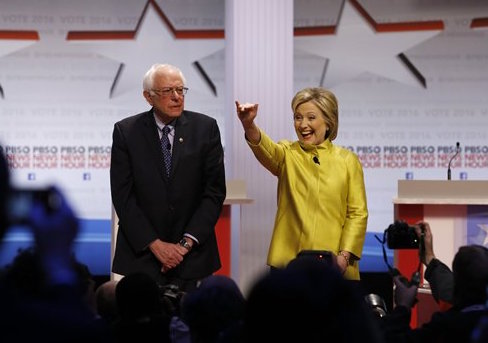Hillary Clinton was projected the winner of the Democratic primaries in Alabama, Arkansas, Georgia, Massachusetts, Virginia, Tennessee, and Texas Tuesday night, while Sen. Bernie Sanders (I., Vt.) was expected to prevail in his home state of Vermont as well as Colorado, Minnesota, and Oklahoma.
Multiple networks called the seven races in favor of Clinton and four in favor of Sanders after polls closed in the states starting at 7 P.M. EST. The primary in Oklahoma was initially too close to call, though Sanders was the projected victor more than an hour after polls closed in the state.
Sanders was the winner in the Colorado Democratic caucus, NBC and Fox News reported late Tuesday, a result that was predicted by a Washington Free Beacon poll released earlier this month. Sanders was also projected the victor in the Minnesota Democratic caucus slightly later.
The primary in Massachusetts was still too early to call several hours after polls closed, early returns showing Sanders within five points of Clinton. Networks called the race for Clinton at about 11:15 P.M. EST.
Super Tuesday presented a significant opportunity for Clinton and her challenger to pick up several states and solidify their positions in the primary race.
Democratic voters in eleven states and one territory headed to the polls to cast their votes. In sum, 1,032 delegates were up for grabs Tuesday, accounting for nearly half of the 2,383 needed to win the Democratic nomination for president.
Clinton has been widely viewed as the favorite to win the primary, despite facing hurdles including scrutiny surrounding her use of private, unsecured email at the State Department, inquiries related to her family foundation, and allegations of ethics violations.
Polling, which has been sparse in some states, has indicated that Clinton held leads over Sanders in Arkansas, Georgia, Minnesota, Tennessee, Texas, and Virginia. Sanders, on the other hand, trailed her closely in polls out of Massachusetts and Oklahoma, indicating that he could pick up those states, especially if younger voters who overwhelmingly support him turn out to the polls.
Sanders was also poised to beat Clinton in the Colorado Democratic caucus, the Free Beacon poll released earlier this month indicating that Sanders had overtaken Clinton in the state by six points less than two weeks before Super Tuesday, though nine percent of likely voters remained undecided.
Vermont presented the firmest opportunity for Sanders to notch a win Tuesday. The senator was beating Clinton by a nearly 80-10 margin in his home state leading up to the primary there, according to recent polls.
Clinton regained momentum in the days leading up to the March 1 primaries despite getting off to a rocky start in early-voting states. Clinton clobbered Sanders in the Democratic primary in South Carolina on Saturday and a week prior registered a narrow win in the Nevada caucus. Sanders nearly bested Clinton in the Iowa caucus earlier in February and recorded a 22-point win over his challenger in New Hampshire.
Sanders’ impressive early showings precipitated a windfall of small donations for his presidential ambitions. His campaign announced Monday that it had raised over $42 million in February, the contributions averaging $30 each.
Sanders, who has been highly critical of Clinton’s ties to Wall Street, has pledged to stay in the race for the long haul.
